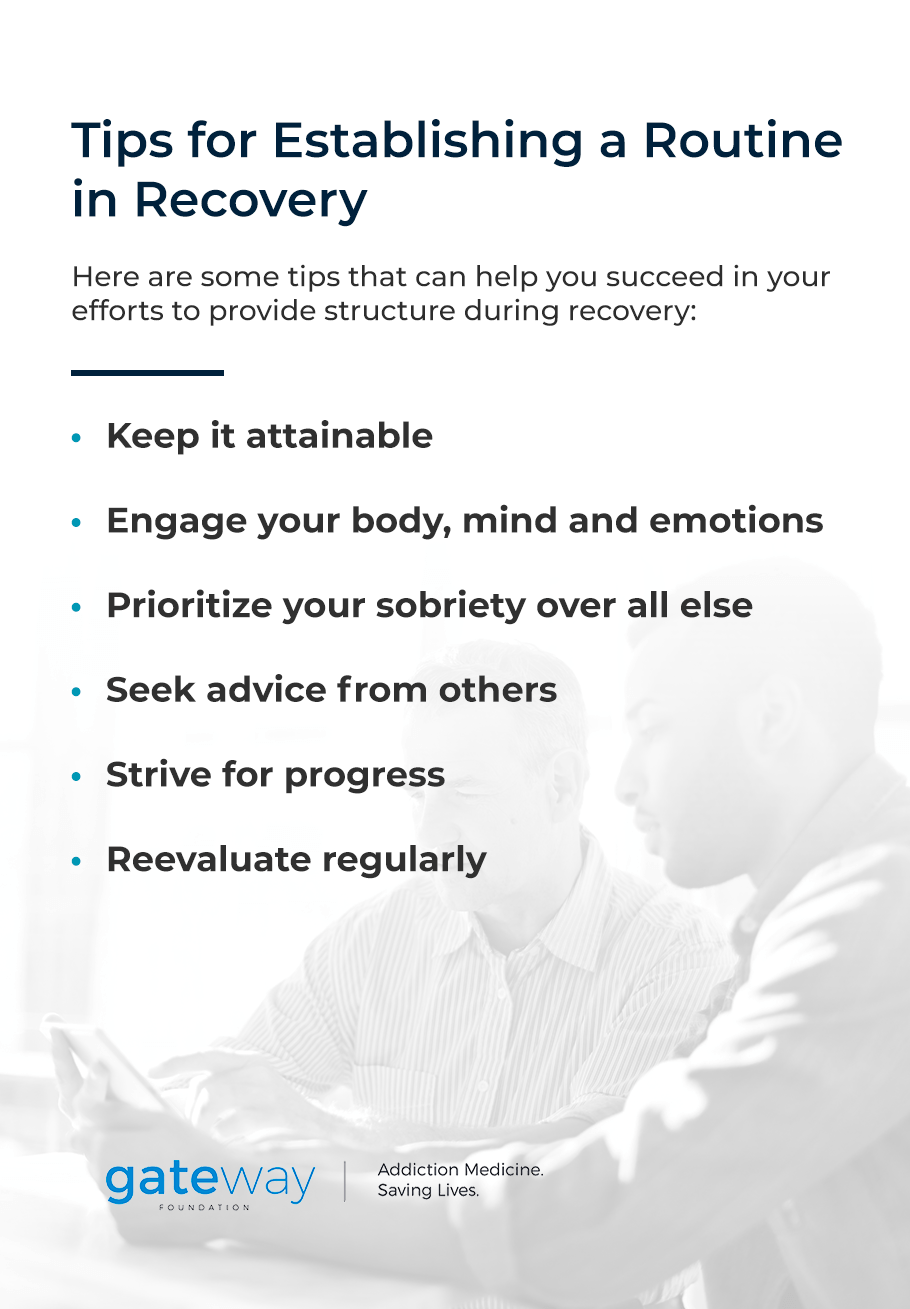- Aug 16
- Drug Addiction Treatment
Structure and routine are key components of a successful recovery from a substance use disorder. Without a healthy routine to follow, it can be easy to fall back into old habits and a dysfunctional lifestyle. Recovery from an addiction can provide the perfect opportunity to reset other areas of your life, as well. These new, healthier habits you develop can help you feel empowered during your recovery journey.
The Benefits of Structure and Routine in Recovery
Structure and routine can help you throughout your recovery journey in several ways. Creating and sticking to a schedule can provide a stabilizing force, help you develop self-control, improve your mental health, keep you engaged and improve your physical health:
1. It Helps You Establish a New Normal
Beginning a recovery journey can be a scary new step for many people struggling with an addiction. Getting used to a new routine can replace your feelings of fear with feelings of stability. Routine provides a sense of security when your life may feel like it’s been turned upside down or when you feel especially vulnerable.
Developing new habits can help you feel like you’re replacing your substance use disorder with new, healthy practices. One study found that it took 66 days on average for people to form habits that became an automatic part of their routine. You may find that after your first two months of sobriety, your new routine begins to feel more instinctive and familiar.
2. It Helps You Exercise Self-Control
Recovering from a substance use disorder is not simply a matter of willpower. Addiction is a disease that must be treated properly. After the initial stages of addiction recovery, self-control becomes an important component of your long-term success. Temptation will come, and when it does, self-discipline can help you resist.
Self-control isn’t something you can muster up whenever needed. It’s more like a muscle you can exercise, according to psychologists. This is encouraging to people in recovery because it means you can build up willpower so it’s there when you need it. Resisting the urge to stay in bed too late or eat an unhealthy snack at night can help you be better prepared to resist the temptation to use drugs or alcohol.
3. It Can Improve Your Self-Esteem and Mental Health
Self-esteem issues can contribute to and result from a substance use disorder. A comprehensive approach to addiction recovery should include therapy to help people address these root issues and encourage healthier self-talk. In addition to therapy, establishing constructive routines can be an excellent way to help people improve their mental health and raise their self-esteem.
Consider the confidence boost you feel when you get up early to exercise or when you reach a goal you’ve been striving toward. Lots of little victories in adhering to a schedule can help you feel in control and accomplished. These positive feelings can help tremendously when you’re experiencing a new level of vulnerability and giving up substances you may have relied on to mask or forget self-esteem issues.
4. It Helps You Avoid Boredom
Another way structure promotes long-term sobriety is in preventing boredom — an issue that can trigger a relapse. A feeling of aimlessness can motivate a person to look to drugs or alcohol as an activity to fill their time or add excitement to their days. A lack of structure with too much free time creates a dangerous dynamic for people in recovery.
If you’ve used substances to combat boredom in the past, it’s especially critical you create a schedule that will help you avoid long stretches of time with nothing to do. A schedule for sobriety should include constructive habits like attending therapy sessions, along with fun activities like hobbies. Staying busy can help you improve your life in many ways and actively avoid the circumstances that could trigger a relapse.
5. It Can Improve Your Physical Health
When you adopt a more consistent schedule, you may notice your physical health improves. A better sleep schedule alone can make a significant difference in your energy levels during the day and your overall health. During the first week of sobriety especially, insomnia can be a common issue. Practicing good sleep hygiene during recovery can help you overcome that initial insomnia and start enjoying restful nights.
Better eating habits and exercise can also help improve your health. People who have dealt with a substance use disorder often have other co-occurring health conditions, such as diabetes or hypertension. A healthy diet and exercise can help with these conditions. Improving your physical health can also help reverse some of the aging effects of drugs or alcohol, helping you feel more youthful and vibrant.
Key Components of a Schedule for Sobriety
Maintaining a schedule during recovery can help you along your journey, but what should this schedule look like? That answer might look different for each person. This is why it’s important to discuss your schedule with a counselor who can help you determine what routines would be most beneficial to you. Some components of a healthy routine include:
- Sleep: Having a regular bedtime and wakeup time in place can help your body get in tune with your circadian rhythm, or internal clock. This can help you sleep better at night and feel more rested during the day. Proper sleep also allows your body to restore itself physically and mentally.
- Exercise: Exercise is an important means of maintaining physical fitness and overall health. Research also demonstrates that exercise can help a person maintain their sobriety. You don’t need to spend all your time at the gym. Simply incorporating some exercise into your daily and weekly routine is a smart move.
- Personal hygiene: Basic hygiene like bathing and brushing and flossing your teeth should have a place in your daily routine. But you don’t have to stop there. Consider scheduling time for a relaxing bubble bath every now and then or adopting a regular skin care routine — anything that helps you feel your best.
- Healthy meals: Eating nutritious meals at regular times can go a long way toward helping you restore your health. If you had unhealthy eating habits before, you may need to learn about nutrition and get some help planning meals so you don’t end up defaulting to unhealthy habits.
- Support meetings: In the early days of your recovery, treatment will be an important part of your days. Even when you formally finish receiving treatment for your addiction, you still need ongoing support. Attending addiction recovery support meetings is an important part of a routine for anyone in recovery.
- Work: If you have a job, you also need to build your schedule around your work commitments. The same is true if you are a student. If your addiction prevented you from holding a job or attending school before, but you’re now able to work, a routine will help you find the right balance between work and personal life.
- Chores: Daily and weekly chores are a normal part of life, but they can become overwhelming when you don’t factor them into your routine. Consider making checklists for basic tasks like taking out the trash or sweeping. When you complete a chore, you can check it off and feel a sense of accomplishment.
- Spiritual practices: Recovery should involve your whole person. That means you should commit to your spiritual and emotional well-being in ways that are meaningful to you. This may include religious reading or prayer, meditation, inspirational reading, journaling or time spent in nature. Identify activities you find restorative, and consider trying something new that others recommend for spiritual fulfillment.
- Hobbies and fun activities: A routine shouldn’t be all work and no play.If you have hobbies that fell to the wayside during your addiction, it’s time to get back into these hobbies. Or maybe it’s time to try a new hobby. If you’ve always wanted to learn to play an instrument, for example, make lessons a part of your new routine.
- Social time: Social time with friends and family can enrich a person’s life greatly and provide vital support during recovery. However, it’s important to note you should only spend social time with supportive friends and family who are not using substances. Otherwise, you could increase your risk of relapse.
The Challenges of Maintaining Routines
Many people know how beneficial the right routine can be in helping them achieve their goals and lead happier, healthier lives, whether they’re in recovery or not. So why do so many people struggle to stick to a schedule? Developing new habits is hard. It takes time to feel comfortable in a new routine, and you’re bound to deviate from time to time as you adjust. You may stay up too late one day or watch too much TV over the weekend.
It’s important to have grace for yourself in these moments and to focus on all your successes. Many people set unrealistically high expectations for themselves, and when they fail to meet these expectations, they give up entirely. This can happen when you try to fit too much into your daily schedule and don’t allow yourself any flexibility.
Achieving Balance With Your Routine
To avoid a scenario of getting overwhelmed and giving up, you need to create a routine that is not overbearing and instead helps you achieve balance in your life. A routine is one of the helpful tools for sobriety, but it shouldn’t control you completely. If you become obsessed with your routine and don’t allow yourself enough flexibility, you could:
- Be resistant when your life changes and your routine needs to adapt.
- Wrongly prioritize aspects of your routine over loved ones’ needs.
- Avoid trying new things that could be helpful additions to your life.
- Start to feel bored with the monotony of a schedule that doesn’t allow for fun.
To avoid these problems, you can create a schedule that offers room for flexibility and regularly reevaluate your schedule to see if you should make any changes. Remember, your routine is a tool. Things come up and life evolves, so your routine should evolve when needed to accommodate these changes.
Achieving the right balance can be tricky, so it’s understandable if you find you err too far to one side — either obsessively sticking to a routine or ignoring it. Keep working at it, and get advice from trusted sources of support to help you navigate your new normal in recovery.
Tips for Establishing a Routine in Recovery
If you’re in the process of creating a schedule or you’re evaluating your schedule, here are some tips that can help you succeed in your efforts to provide structure during recovery:
- Keep it attainable: Trying to schedule every second of your day or expecting to do a rigorous exercise routine every day is likely to leave you feeling like a failure much of the time. It’s better to create a routine that is more realistic. This means adding some time flexibility. If you have big goals for fitness or personal accomplishments, this also means building up to them one step at a time.
- Engage your body, mind and emotions: Try to incorporate activities into your routine that enrich your life physically, mentally, and emotionally or spiritually. This may mean taking part in activities like yoga that are intended to engage you in all these ways. Or you may try to include activities aimed at each of these aspects of your person.
- Prioritize your sobriety over all else: Remember that during recovery, your sobriety is the number one goal. Your routine should help you achieve that goal, not overwhelm you and contribute to a relapse. That means if any aspect of your schedule is placing too much demand on you or is crowding out activities essential to your sobriety, like support group meetings, it’s time to adjust your schedule.
- Seek advice from others: If you know other people who have experienced an addiction recovery journey, ask them what advice they can offer for establishing a healthy routine. Find out what did and didn’t work for them and consider these insights as you work on your own schedule. It’s also important to understand that what worked best for someone may not work best for you since everyone is different.
- Strive for progress: When you go through a drive-thru for dinner instead of cooking a healthy meal, or when you choose to take a nap instead of doing a chore, don’t beat yourself up. Use these opportunities to learn and reflect on your progress as a person. Celebrate your successes and look for progress rather than perfection.
- Reevaluate regularly: To come up with the best schedule for your life complete with a healthy balance, you need to go through some trial and error. Consider journaling or reflecting periodically on how your routine is going. If something’s not working for you, try something new. If you’re feeling bored, incorporate a new activity.
Treatment for Addiction From Gateway Foundation
At Gateway Foundation, we understand the importance of structure in addiction recovery, as well as other factors that can help a person gain freedom from their addiction. Gateway Foundation offers a comprehensive set of programs and services to help people at all stages of their recovery journey. Even long after your treatment ends, we continue to offer ongoing support to our patients.
We can help provide the structure you need to be successful in this exciting and challenging new time. If you or a loved one needs medical treatment, therapy or a support program for a substance use disorder, contact Gateway Foundation to learn more about how we can help.






